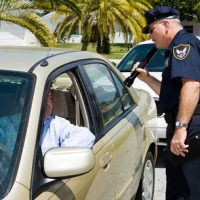Vehicle Searches In Florida: What Can Police Search After I Am Pulled Over

During a traffic stop, there are situations where an officer may or may not search parts of your vehicle. The Fourth Amendment of the U.S. Constitution protects you from unlawful searches by law enforcement officers. In many cases, officers must have a valid warrant before searching and seizing any type of potential evidence. This includes searches of your home and private property.
There are some exceptions to the warrant requirement where vehicle searches are involved, however. The main exception is probable cause. Where probable cause exists to believe that a vehicle contains criminal evidence, officers may search any area of the vehicle in which evidence might be found.
For example, if officers can smell marijuana or alcohol coming from your car, or see drug paraphernalia sitting on the passenger seat, they could have “reasonable suspicion” that leads to a lawful inspection of your glove compartment, trunk, and other areas where contraband might be stored. On the other hand, if you were simply stopped for speeding, an officer cannot proceed to open doors and inspect the interior of your vehicle.
Florida Statutes, Sec. 933.19 incorporates the reasoning of the U.S. Supreme Court regarding officer searches of vehicles carrying contraband and illegal merchandise. The statute essentially reinforces the idea that evidence seized without a warrant can be admissible under certain circumstances.
Some other exceptions to the search warrant requirement in vehicle search cases include:
- Consent; Under the Fourth Amendment, police may search a vehicle or people within the vehicle with the consent of those being searched. This can be problematic in many cases where people did not know they had a Constitutional right to deny consent to a search. Consent can also be a contested issue where officers used intimidating or coercive conduct during questioning.
- Search incident to arrest; If a person is being arrested during a traffic stop, police may have valid safety reasons to search the vehicle prior to towing or impounding it. Evidence obtained during that search can often be used by the prosecution at trial.
- Plain view; If certain items or contraband were readily visible (a handgun in the passenger seat or drugs in a cupholder, for example), they may usually be searched and seized without a warrant.
- Exigent circumstances or emergency purpose; If there is some type of public safety reason involved, or there is a threat that potential evidence will be imminently destroyed, a vehicle search may be permissible without a warrant.
When to Seek Legal Help Regarding a Vehicle Search Issue
It is important to know your legal rights before a traffic stop and vehicle search occurs. Police officers have to follow strict procedures to observe the Constitutional rights of those being questioned in a traffic stop. Failures to follow proper search and seizure methods can infringe on a person’s liberty and render potential evidence inadmissible in court.
Even after a vehicle has been searched and a person arrested, it is not too late to seek skilled legal help. An experienced Orlando, Florida criminal defense attorney can carefully review the evidence seized and manner in which it was obtained – if your Fourth Amendment rights were violated, certain pieces of evidence can be suppressed and thrown out during the pre-trial process.
Our Attorneys at Joshi Law, PA, Can Help After a Vehicle Search
If you have been charged with a crime following a traffic stop, time is of the essence. You need an attorney who knows the law and knows when certain police tactics cross the line into unlawful searches and seizures. Our Orlando criminal attorneys at Joshi Law Firm, PA can raise critical issues and file necessary motions to protect your Constitutional rights, potentially having your charges reduced or dismissed.
Source:
supremecourt.gov/opinions/08pdf/07-542.pdf
